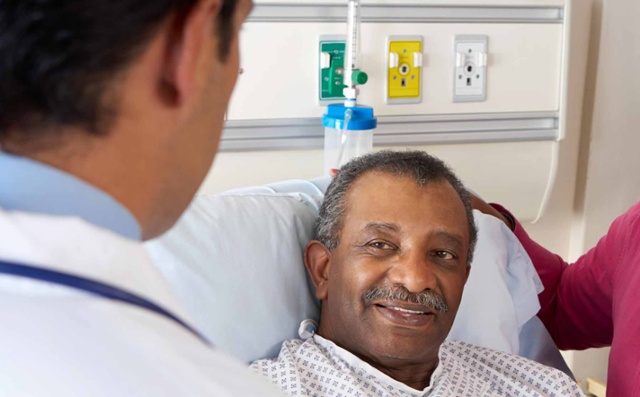These days, the majority of post-surgery recovery care takes place at home.
According to a statistical brief provided by the Agency for Healthcare Research and Quality, 28.6 million surgeries were performed in the United States in 2012. Of those surgeries, 65% were outpatient surgeries or ambulatory surgeries.
Specific postoperative care varies by patient and operation. However, following some basic tips can help in the recovery from any type of surgery.
1. Support System and Recovery Plan
Put together a support system to help you with daily activities. You will be amazed how many friends, family, and even co-workers are willing to help you out during this time.
One of the first things you will want to do is put together a postoperative first aid kit that includes bandages, tape, ointments, etc.—namely, anything you will need for changing your bandages. If you are one of those people who gets a queasy stomach easily or you are not going to be able to see your incision area, ask your spouse or a close friend to help you change your bandages. Make sure to set up a scheduled time for bandage and wound care that complies with the instructions from your doctor.
If you play chauffeur to your children, find someone or even a few people who can take the kids to and from their sporting events or school activities.

Set up a chore schedule with your children to help do some basic household chores, like vacuuming, dusting, and even folding the laundry. Such a schedule will not only help you, but also allow your children to feel as though they are contributing to your recovery. If you don’t have any children, find a friend who is willing to come over a couple of times to do minor household chores for you. Hire someone to do your yard work during your recovery time.
Preplan your meals and even prepare and freeze some meals in advance so you won’t have to cook. Go to the grocery store and stock up on the items you will need during your recovery time.
If you are concerned about missing too much work, talk to your boss or supervisor. You might be able to make arrangements to do some work from home. With today’s technologies, you might be able to log into your office network from your own laptop, providing you with the ability to stay in touch with the office while you recover.
Creating a solid support system will help alleviate your stress after surgery. Lower stress = faster recovery!
2. Follow The Doctor’s Instructions

Following your doctor’s instructions prior to and after surgery is important, but remember that the instructions the doctor gives you are the same instructions he/she gives everyone else who has your same surgery. If you feel some of the instructions don’t suit your lifestyle or needs, talk in depth with your doctor about it. You’ll find most doctors are receptive to altering some of the instructions to suit your specific needs rather than just following generic instructions.
For example: Maybe you’re the type of person who can’t lie down and rest for a day, and you have no idea how you’re going to lie on the couch for an entire week, doing absolutely nothing.
Don’t stress out about it. Talk to your doctor. He or she will be able to advise you on what activity you might be able to try and exactly which ones you should avoid until your first follow-up appointment. Believe it or not, the quicker you are able to get up and move around, the quicker your recovery time. Also, if you are currently on any medications, supplements, vitamins, and/or herbal supplements, talk with your doctor about how they might interact with medications prescribed after surgery. This could avoid an unnecessary trip to the emergency room.
Prior to your surgery, your doctor will schedule your postoperative follow-up appointments. These appointments are very important. Your first follow-up appointment, which should take place within the first few weeks following surgery, allows the doctor the opportunity to examine you and see how well you are healing after the surgery. The doctor will be able to advise you on what medications, vitamins, supplements, etc., you can begin taking again and which ones to avoid. He/She will also be able to determine if some restrictions can be lifted from your daily routine. Prior to this first appointment, write down any questions you have or concerns you’ve come across since the surgery. Leave no stone unturned. The more the doctor can inform you about what’s going on with your body, the better able you will be to aid in your own recovery.
3. Caring for Your Incision
Every incision will come with it’s own care instructions.
Follow them!
If you are instructed to clean your incision, do so carefully, using warm water and mild soap.
Pat your incision dry with a clean towel or allow it to air dry
Always change your dressing as often as instructed by your doctor
DON’T’s:
– Do not scratch at your incision
– Do not poke at your incision
These may all be signs of infection. If you suspect an infection, call your doctor or surgeon and let them know right away.
4. Reduce Scarring of Incision Area
At your first follow-up appointment, check with your doctor as to when it is acceptable to start applying scar-reducing ointments such as vitamin E gel/oil, Mederma, witch hazel, or silicon gel strips.
5. Rest

It’s important to get plenty of rest after your surgery. Immediately following surgery, your body is still recovering from the anesthesia effects. It can take up to 24 hours for anesthesia to wear off and in some cases longer. During this time, rest is the best course of action. Allow time for your body to begin the healing process. You may also be experiencing a lot of pain. Taking pain medication could make you drowsy, so lie in bed or on a comfy couch, elevate the incision if possible, apply an ice pack to help reduce both inflammation and swelling at the incision area, and binge watch your favorite TV shows or movies.
6. Physical Activity
After surgery, it is sometimes difficult to get up and move around, but that is exactly what helps with your recovery. Ask your doctor when it is safe to start walking. Just walking around inside your home will help improve blood flow to your extremities and aid in your wound healing. Go at your own pace. Depending on the type of surgery you had, the more difficult this may seem. Just stick with it. Sometimes, just getting out of bed is the hard part, so don’t be afraid to ask for help. You may even want to have someone walk along with you for company.
The alternative to not getting up and moving is a slower healing process. Depending on how long you stay in bed, the circulation to your legs will slow down, which could cause blood clots to form or you could develop pressure sores.
If your surgery requires you to stay in bed, there are some bed exercises you can do to help with circulation. You will want to roll from your back to your side regularly to help prevent bed sores. You may also try arm, leg, and ankle stretches. There’s even a palm stretch.
Remember to consult with your surgeon prior to your surgery about the types of physical activities you can perform safely after surgery. You never want to perform any activities that could cause your incision to tear or put added stress on your body.
7. Foods that Help the Healing Process

Water is the best choice for rehydration after surgery, but you may also drink soda and juices. Lean protein aids in the healing of your incision, so try to eat food that contains plenty of lean protein, such as:
If you are on antibiotics, you may want to add some fermented dairy, like yogurt, to help replenish the beneficial bacteria in your digestive tract. Speaking of your digestive tract, fiber will help to keep things moving along when you’re on pain medication. Good sources of fiber are:
You will also want to boost your antioxidant intake by eating plenty of berries and vegetables, such as:
These are high in vitamin A, which is needed to repair and maintain soft tissue and skin.
8. Keeping Your Pain Under Control
Pain can be debilitating, especially after a surgery. Be sure to take your pain medication as prescribed by your surgeon. During your recovery, your body heals best when it’s resting. If your pain is keeping you up at night or waking you frequently, you are not getting the necessary rest for a proper recovery. Taking your pain medication will also help keep your pain at a tolerable level, allowing you the ability to get up and walk around.
Important: Remember to drink plenty of water when taking your pain medication as some medications can lead to dehydration and constipation.
9. Stop Smoking
 People who smoke run a higher risk of complications from their surgery than those who don’t smoke. When you smoke, the carbon monoxide and nicotine are absorbed by your blood, causing your blood oxygen level to fall—not to mention, it restricts your blood flow. Oxygen is essential for wound healing. The more you smoke, the more likely it is that your wounds will take longer to heal and may even become infected.
People who smoke run a higher risk of complications from their surgery than those who don’t smoke. When you smoke, the carbon monoxide and nicotine are absorbed by your blood, causing your blood oxygen level to fall—not to mention, it restricts your blood flow. Oxygen is essential for wound healing. The more you smoke, the more likely it is that your wounds will take longer to heal and may even become infected.
By stopping just 24 hours before a surgery, you begin to increase the oxygen in your blood because the carbon monoxide and nicotine have already begun to break down. Most doctors would advise you to stop smoking at least 4 weeks prior to your surgery and for up to 4 weeks immediately following your surgery. Most plastic surgeons won’t even perform surgery if they know you have been smoking.
10. Listen to Your Body
No one knows your body better than you. Sleep if you’re tired, eat if you’re hungry, and drink if you’re thirsty. While your mind might be telling you to get things back to normal, it’s your body that has just gone through the trauma and is still in recovery mode. Heed what it’s telling you.
FREE Case Consultation
Fill out the form below and we will contact you.
[grow-contact-form]
Or, give us a call at